Assessing the Impact of Small and Micro Businesses on the UK Economy
VerifiedAdded on 2020/07/22
|20
|5726
|94
Report
AI Summary
This report delves into the multifaceted impact of small and micro businesses on the UK economy. It begins by defining entrepreneurship and exploring various types of entrepreneurial ventures, including small businesses, social enterprises, and large corporations, examining their characteristics, objectives, and operational structures. The report then compares and contrasts these ventures, highlighting their similarities such as profit motives, and their differences in ownership, liability, and decision-making processes. Furthermore, the report assesses the significant influence of micro and small businesses on economic growth, job creation, and market dynamics, providing relevant data and statistics to support its analysis. The report also explores various capital providers and the outcomes of these businesses including providing products and services to the public. Finally, it discusses the role of entrepreneurs in fostering innovation and driving economic development in the UK. The report concludes with an emphasis on the importance of understanding the diverse landscape of entrepreneurial ventures for promoting sustainable economic progress.

Entrepreneurship
Paraphrase This Document
Need a fresh take? Get an instant paraphrase of this document with our AI Paraphraser
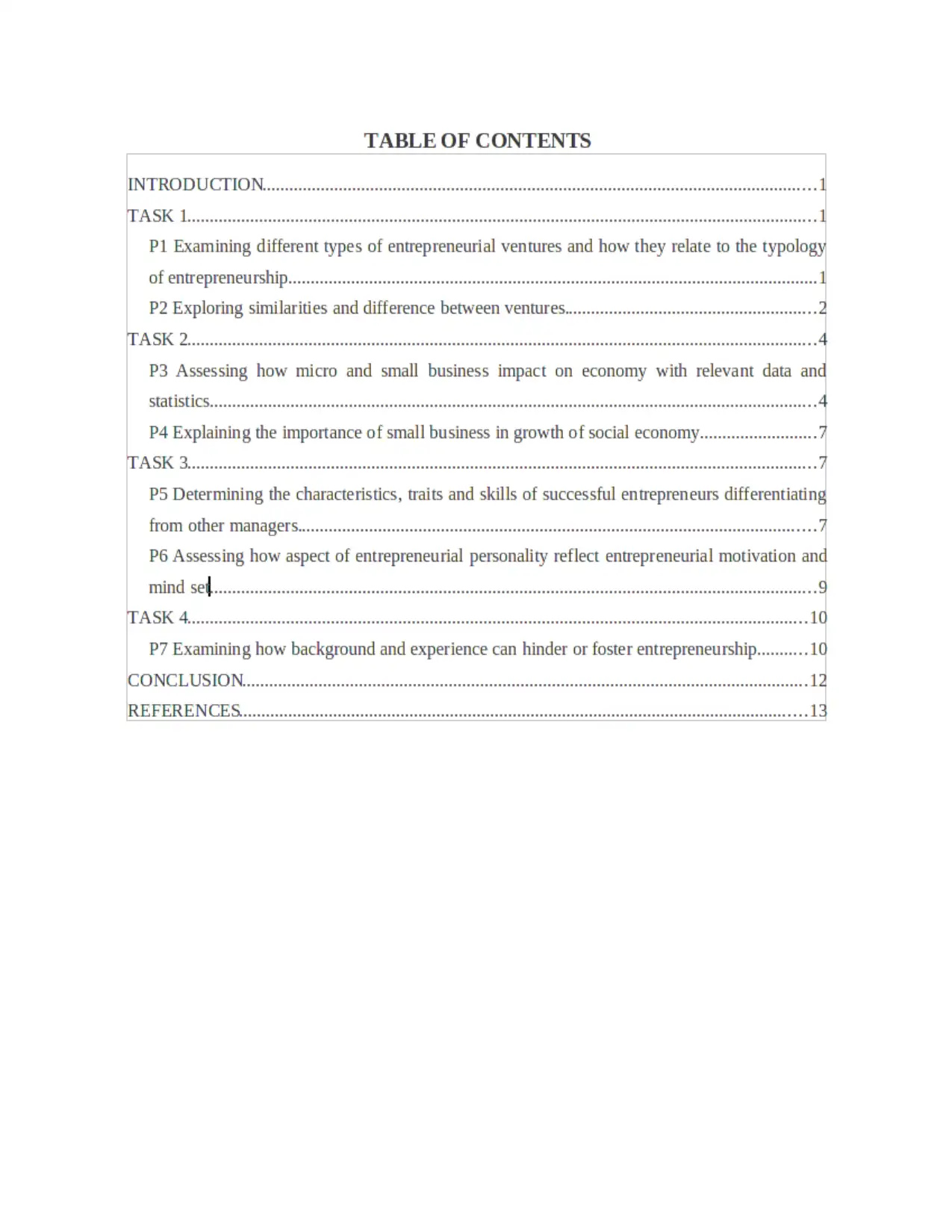
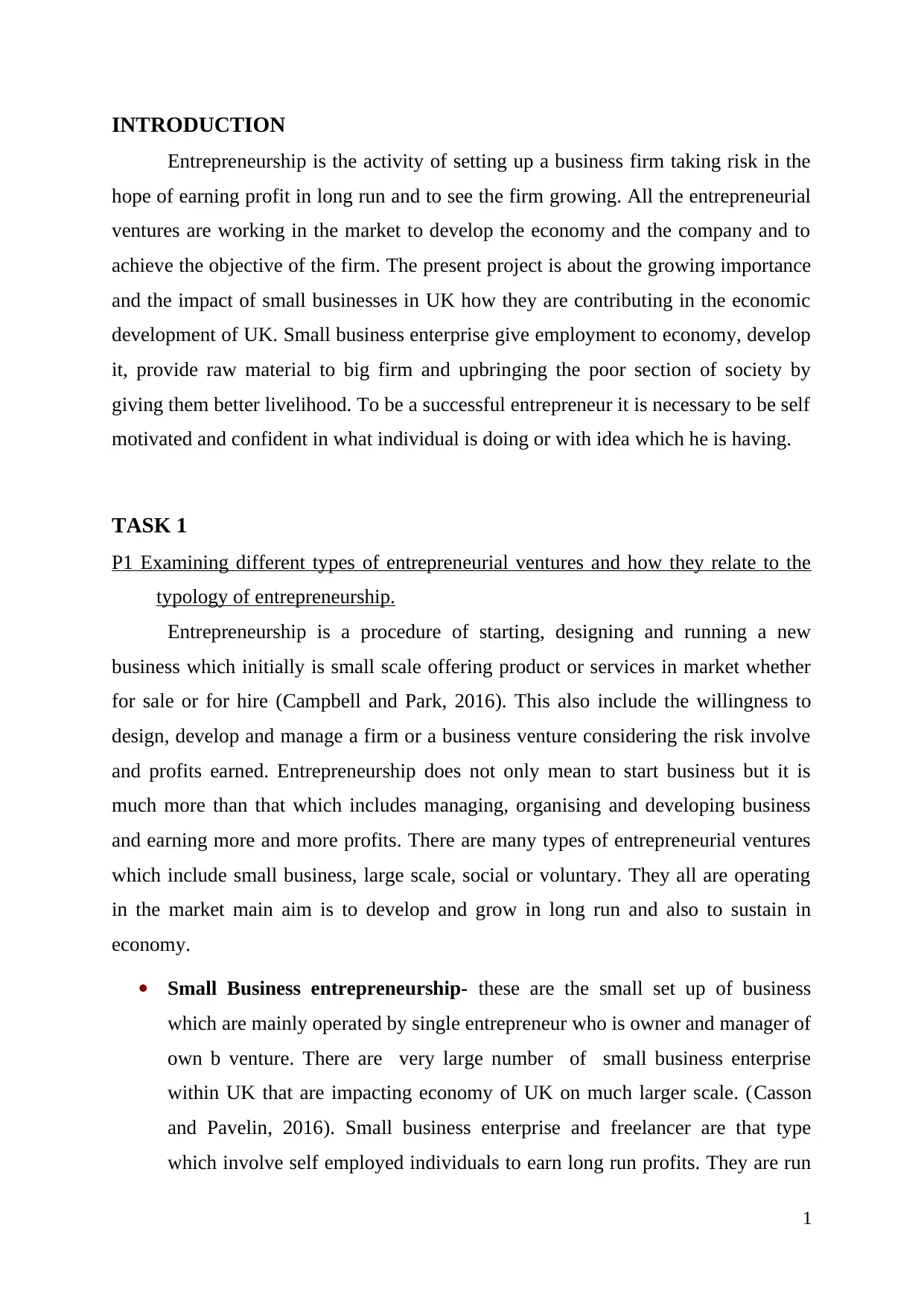
INTRODUCTION
Entrepreneurship is the activity of setting up a business firm taking risk in the
hope of earning profit in long run and to see the firm growing. All the entrepreneurial
ventures are working in the market to develop the economy and the company and to
achieve the objective of the firm. The present project is about the growing importance
and the impact of small businesses in UK how they are contributing in the economic
development of UK. Small business enterprise give employment to economy, develop
it, provide raw material to big firm and upbringing the poor section of society by
giving them better livelihood. To be a successful entrepreneur it is necessary to be self
motivated and confident in what individual is doing or with idea which he is having.
TASK 1
P1 Examining different types of entrepreneurial ventures and how they relate to the
typology of entrepreneurship.
Entrepreneurship is a procedure of starting, designing and running a new
business which initially is small scale offering product or services in market whether
for sale or for hire (Campbell and Park, 2016). This also include the willingness to
design, develop and manage a firm or a business venture considering the risk involve
and profits earned. Entrepreneurship does not only mean to start business but it is
much more than that which includes managing, organising and developing business
and earning more and more profits. There are many types of entrepreneurial ventures
which include small business, large scale, social or voluntary. They all are operating
in the market main aim is to develop and grow in long run and also to sustain in
economy.
Small Business entrepreneurship- these are the small set up of business
which are mainly operated by single entrepreneur who is owner and manager of
own b venture. There are very large number of small business enterprise
within UK that are impacting economy of UK on much larger scale. (Casson
and Pavelin, 2016). Small business enterprise and freelancer are that type
which involve self employed individuals to earn long run profits. They are run
1
Entrepreneurship is the activity of setting up a business firm taking risk in the
hope of earning profit in long run and to see the firm growing. All the entrepreneurial
ventures are working in the market to develop the economy and the company and to
achieve the objective of the firm. The present project is about the growing importance
and the impact of small businesses in UK how they are contributing in the economic
development of UK. Small business enterprise give employment to economy, develop
it, provide raw material to big firm and upbringing the poor section of society by
giving them better livelihood. To be a successful entrepreneur it is necessary to be self
motivated and confident in what individual is doing or with idea which he is having.
TASK 1
P1 Examining different types of entrepreneurial ventures and how they relate to the
typology of entrepreneurship.
Entrepreneurship is a procedure of starting, designing and running a new
business which initially is small scale offering product or services in market whether
for sale or for hire (Campbell and Park, 2016). This also include the willingness to
design, develop and manage a firm or a business venture considering the risk involve
and profits earned. Entrepreneurship does not only mean to start business but it is
much more than that which includes managing, organising and developing business
and earning more and more profits. There are many types of entrepreneurial ventures
which include small business, large scale, social or voluntary. They all are operating
in the market main aim is to develop and grow in long run and also to sustain in
economy.
Small Business entrepreneurship- these are the small set up of business
which are mainly operated by single entrepreneur who is owner and manager of
own b venture. There are very large number of small business enterprise
within UK that are impacting economy of UK on much larger scale. (Casson
and Pavelin, 2016). Small business enterprise and freelancer are that type
which involve self employed individuals to earn long run profits. They are run
1
⊘ This is a preview!⊘
Do you want full access?
Subscribe today to unlock all pages.

Trusted by 1+ million students worldwide
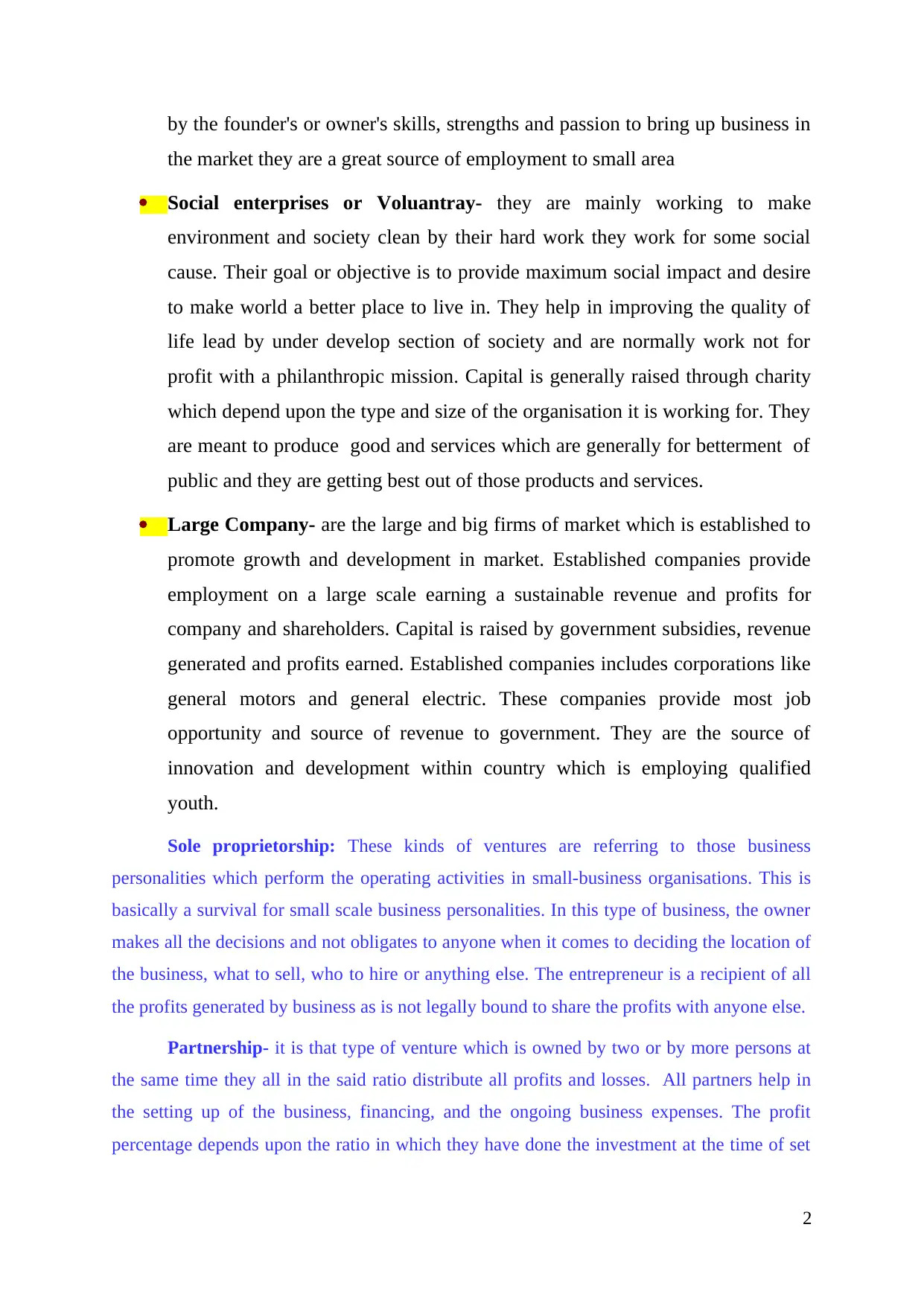
by the founder's or owner's skills, strengths and passion to bring up business in
the market they are a great source of employment to small area
Social enterprises or Voluantray- they are mainly working to make
environment and society clean by their hard work they work for some social
cause. Their goal or objective is to provide maximum social impact and desire
to make world a better place to live in. They help in improving the quality of
life lead by under develop section of society and are normally work not for
profit with a philanthropic mission. Capital is generally raised through charity
which depend upon the type and size of the organisation it is working for. They
are meant to produce good and services which are generally for betterment of
public and they are getting best out of those products and services.
Large Company- are the large and big firms of market which is established to
promote growth and development in market. Established companies provide
employment on a large scale earning a sustainable revenue and profits for
company and shareholders. Capital is raised by government subsidies, revenue
generated and profits earned. Established companies includes corporations like
general motors and general electric. These companies provide most job
opportunity and source of revenue to government. They are the source of
innovation and development within country which is employing qualified
youth.
Sole proprietorship: These kinds of ventures are referring to those business
personalities which perform the operating activities in small-business organisations. This is
basically a survival for small scale business personalities. In this type of business, the owner
makes all the decisions and not obligates to anyone when it comes to deciding the location of
the business, what to sell, who to hire or anything else. The entrepreneur is a recipient of all
the profits generated by business as is not legally bound to share the profits with anyone else.
Partnership- it is that type of venture which is owned by two or by more persons at
the same time they all in the said ratio distribute all profits and losses. All partners help in
the setting up of the business, financing, and the ongoing business expenses. The profit
percentage depends upon the ratio in which they have done the investment at the time of set
2
the market they are a great source of employment to small area
Social enterprises or Voluantray- they are mainly working to make
environment and society clean by their hard work they work for some social
cause. Their goal or objective is to provide maximum social impact and desire
to make world a better place to live in. They help in improving the quality of
life lead by under develop section of society and are normally work not for
profit with a philanthropic mission. Capital is generally raised through charity
which depend upon the type and size of the organisation it is working for. They
are meant to produce good and services which are generally for betterment of
public and they are getting best out of those products and services.
Large Company- are the large and big firms of market which is established to
promote growth and development in market. Established companies provide
employment on a large scale earning a sustainable revenue and profits for
company and shareholders. Capital is raised by government subsidies, revenue
generated and profits earned. Established companies includes corporations like
general motors and general electric. These companies provide most job
opportunity and source of revenue to government. They are the source of
innovation and development within country which is employing qualified
youth.
Sole proprietorship: These kinds of ventures are referring to those business
personalities which perform the operating activities in small-business organisations. This is
basically a survival for small scale business personalities. In this type of business, the owner
makes all the decisions and not obligates to anyone when it comes to deciding the location of
the business, what to sell, who to hire or anything else. The entrepreneur is a recipient of all
the profits generated by business as is not legally bound to share the profits with anyone else.
Partnership- it is that type of venture which is owned by two or by more persons at
the same time they all in the said ratio distribute all profits and losses. All partners help in
the setting up of the business, financing, and the ongoing business expenses. The profit
percentage depends upon the ratio in which they have done the investment at the time of set
2
Paraphrase This Document
Need a fresh take? Get an instant paraphrase of this document with our AI Paraphraser
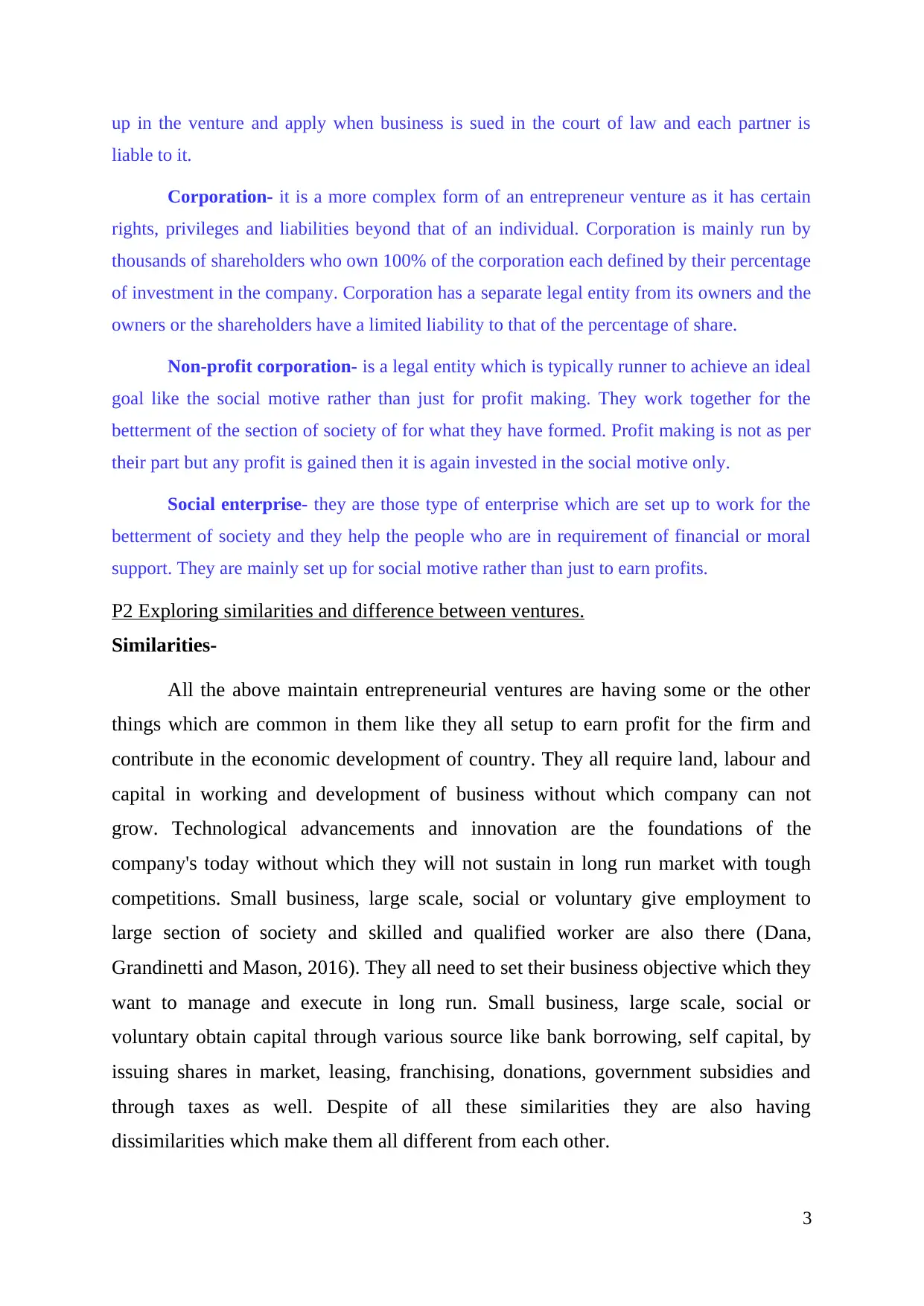
up in the venture and apply when business is sued in the court of law and each partner is
liable to it.
Corporation- it is a more complex form of an entrepreneur venture as it has certain
rights, privileges and liabilities beyond that of an individual. Corporation is mainly run by
thousands of shareholders who own 100% of the corporation each defined by their percentage
of investment in the company. Corporation has a separate legal entity from its owners and the
owners or the shareholders have a limited liability to that of the percentage of share.
Non-profit corporation- is a legal entity which is typically runner to achieve an ideal
goal like the social motive rather than just for profit making. They work together for the
betterment of the section of society of for what they have formed. Profit making is not as per
their part but any profit is gained then it is again invested in the social motive only.
Social enterprise- they are those type of enterprise which are set up to work for the
betterment of society and they help the people who are in requirement of financial or moral
support. They are mainly set up for social motive rather than just to earn profits.
P2 Exploring similarities and difference between ventures.
Similarities-
All the above maintain entrepreneurial ventures are having some or the other
things which are common in them like they all setup to earn profit for the firm and
contribute in the economic development of country. They all require land, labour and
capital in working and development of business without which company can not
grow. Technological advancements and innovation are the foundations of the
company's today without which they will not sustain in long run market with tough
competitions. Small business, large scale, social or voluntary give employment to
large section of society and skilled and qualified worker are also there (Dana,
Grandinetti and Mason, 2016). They all need to set their business objective which they
want to manage and execute in long run. Small business, large scale, social or
voluntary obtain capital through various source like bank borrowing, self capital, by
issuing shares in market, leasing, franchising, donations, government subsidies and
through taxes as well. Despite of all these similarities they are also having
dissimilarities which make them all different from each other.
3
liable to it.
Corporation- it is a more complex form of an entrepreneur venture as it has certain
rights, privileges and liabilities beyond that of an individual. Corporation is mainly run by
thousands of shareholders who own 100% of the corporation each defined by their percentage
of investment in the company. Corporation has a separate legal entity from its owners and the
owners or the shareholders have a limited liability to that of the percentage of share.
Non-profit corporation- is a legal entity which is typically runner to achieve an ideal
goal like the social motive rather than just for profit making. They work together for the
betterment of the section of society of for what they have formed. Profit making is not as per
their part but any profit is gained then it is again invested in the social motive only.
Social enterprise- they are those type of enterprise which are set up to work for the
betterment of society and they help the people who are in requirement of financial or moral
support. They are mainly set up for social motive rather than just to earn profits.
P2 Exploring similarities and difference between ventures.
Similarities-
All the above maintain entrepreneurial ventures are having some or the other
things which are common in them like they all setup to earn profit for the firm and
contribute in the economic development of country. They all require land, labour and
capital in working and development of business without which company can not
grow. Technological advancements and innovation are the foundations of the
company's today without which they will not sustain in long run market with tough
competitions. Small business, large scale, social or voluntary give employment to
large section of society and skilled and qualified worker are also there (Dana,
Grandinetti and Mason, 2016). They all need to set their business objective which they
want to manage and execute in long run. Small business, large scale, social or
voluntary obtain capital through various source like bank borrowing, self capital, by
issuing shares in market, leasing, franchising, donations, government subsidies and
through taxes as well. Despite of all these similarities they are also having
dissimilarities which make them all different from each other.
3
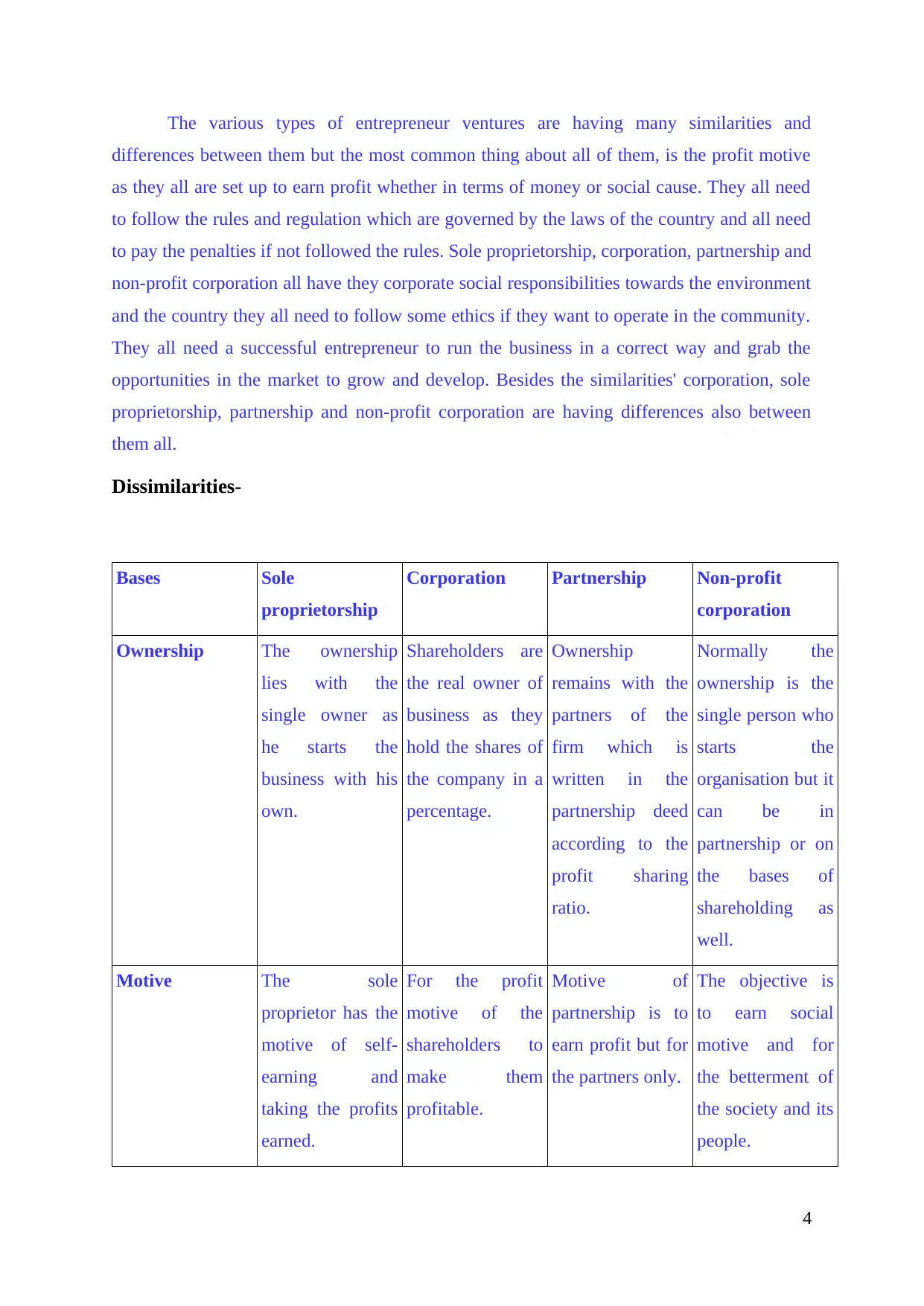
The various types of entrepreneur ventures are having many similarities and
differences between them but the most common thing about all of them, is the profit motive
as they all are set up to earn profit whether in terms of money or social cause. They all need
to follow the rules and regulation which are governed by the laws of the country and all need
to pay the penalties if not followed the rules. Sole proprietorship, corporation, partnership and
non-profit corporation all have they corporate social responsibilities towards the environment
and the country they all need to follow some ethics if they want to operate in the community.
They all need a successful entrepreneur to run the business in a correct way and grab the
opportunities in the market to grow and develop. Besides the similarities' corporation, sole
proprietorship, partnership and non-profit corporation are having differences also between
them all.
Dissimilarities-
Bases Sole
proprietorship
Corporation Partnership Non-profit
corporation
Ownership The ownership
lies with the
single owner as
he starts the
business with his
own.
Shareholders are
the real owner of
business as they
hold the shares of
the company in a
percentage.
Ownership
remains with the
partners of the
firm which is
written in the
partnership deed
according to the
profit sharing
ratio.
Normally the
ownership is the
single person who
starts the
organisation but it
can be in
partnership or on
the bases of
shareholding as
well.
Motive The sole
proprietor has the
motive of self-
earning and
taking the profits
earned.
For the profit
motive of the
shareholders to
make them
profitable.
Motive of
partnership is to
earn profit but for
the partners only.
The objective is
to earn social
motive and for
the betterment of
the society and its
people.
4
differences between them but the most common thing about all of them, is the profit motive
as they all are set up to earn profit whether in terms of money or social cause. They all need
to follow the rules and regulation which are governed by the laws of the country and all need
to pay the penalties if not followed the rules. Sole proprietorship, corporation, partnership and
non-profit corporation all have they corporate social responsibilities towards the environment
and the country they all need to follow some ethics if they want to operate in the community.
They all need a successful entrepreneur to run the business in a correct way and grab the
opportunities in the market to grow and develop. Besides the similarities' corporation, sole
proprietorship, partnership and non-profit corporation are having differences also between
them all.
Dissimilarities-
Bases Sole
proprietorship
Corporation Partnership Non-profit
corporation
Ownership The ownership
lies with the
single owner as
he starts the
business with his
own.
Shareholders are
the real owner of
business as they
hold the shares of
the company in a
percentage.
Ownership
remains with the
partners of the
firm which is
written in the
partnership deed
according to the
profit sharing
ratio.
Normally the
ownership is the
single person who
starts the
organisation but it
can be in
partnership or on
the bases of
shareholding as
well.
Motive The sole
proprietor has the
motive of self-
earning and
taking the profits
earned.
For the profit
motive of the
shareholders to
make them
profitable.
Motive of
partnership is to
earn profit but for
the partners only.
The objective is
to earn social
motive and for
the betterment of
the society and its
people.
4
⊘ This is a preview!⊘
Do you want full access?
Subscribe today to unlock all pages.

Trusted by 1+ million students worldwide
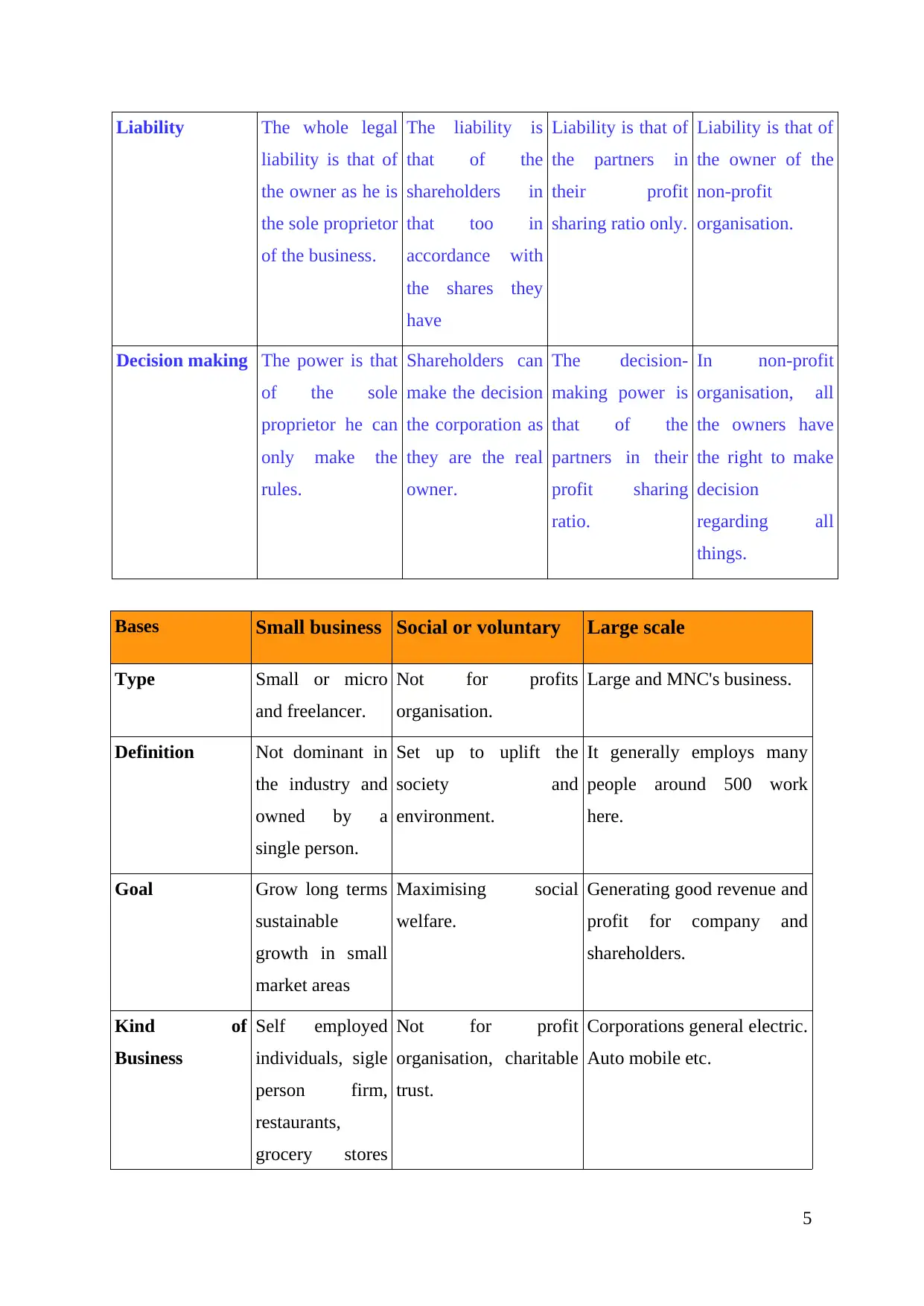
Liability The whole legal
liability is that of
the owner as he is
the sole proprietor
of the business.
The liability is
that of the
shareholders in
that too in
accordance with
the shares they
have
Liability is that of
the partners in
their profit
sharing ratio only.
Liability is that of
the owner of the
non-profit
organisation.
Decision making The power is that
of the sole
proprietor he can
only make the
rules.
Shareholders can
make the decision
the corporation as
they are the real
owner.
The decision-
making power is
that of the
partners in their
profit sharing
ratio.
In non-profit
organisation, all
the owners have
the right to make
decision
regarding all
things.
Bases Small business Social or voluntary Large scale
Type Small or micro
and freelancer.
Not for profits
organisation.
Large and MNC's business.
Definition Not dominant in
the industry and
owned by a
single person.
Set up to uplift the
society and
environment.
It generally employs many
people around 500 work
here.
Goal Grow long terms
sustainable
growth in small
market areas
Maximising social
welfare.
Generating good revenue and
profit for company and
shareholders.
Kind of
Business
Self employed
individuals, sigle
person firm,
restaurants,
grocery stores
Not for profit
organisation, charitable
trust.
Corporations general electric.
Auto mobile etc.
5
liability is that of
the owner as he is
the sole proprietor
of the business.
The liability is
that of the
shareholders in
that too in
accordance with
the shares they
have
Liability is that of
the partners in
their profit
sharing ratio only.
Liability is that of
the owner of the
non-profit
organisation.
Decision making The power is that
of the sole
proprietor he can
only make the
rules.
Shareholders can
make the decision
the corporation as
they are the real
owner.
The decision-
making power is
that of the
partners in their
profit sharing
ratio.
In non-profit
organisation, all
the owners have
the right to make
decision
regarding all
things.
Bases Small business Social or voluntary Large scale
Type Small or micro
and freelancer.
Not for profits
organisation.
Large and MNC's business.
Definition Not dominant in
the industry and
owned by a
single person.
Set up to uplift the
society and
environment.
It generally employs many
people around 500 work
here.
Goal Grow long terms
sustainable
growth in small
market areas
Maximising social
welfare.
Generating good revenue and
profit for company and
shareholders.
Kind of
Business
Self employed
individuals, sigle
person firm,
restaurants,
grocery stores
Not for profit
organisation, charitable
trust.
Corporations general electric.
Auto mobile etc.
5
Paraphrase This Document
Need a fresh take? Get an instant paraphrase of this document with our AI Paraphraser
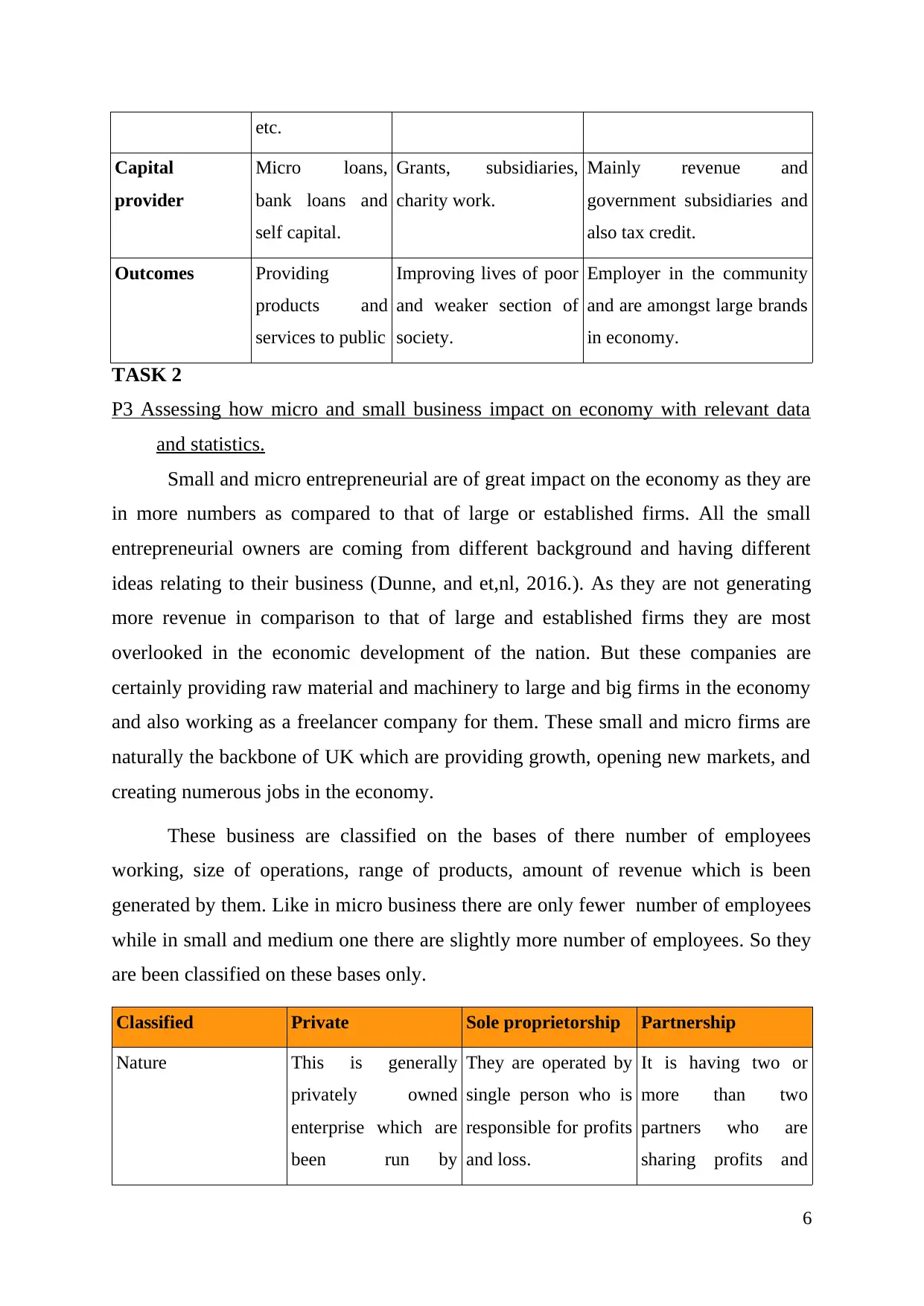
etc.
Capital
provider
Micro loans,
bank loans and
self capital.
Grants, subsidiaries,
charity work.
Mainly revenue and
government subsidiaries and
also tax credit.
Outcomes Providing
products and
services to public
Improving lives of poor
and weaker section of
society.
Employer in the community
and are amongst large brands
in economy.
TASK 2
P3 Assessing how micro and small business impact on economy with relevant data
and statistics.
Small and micro entrepreneurial are of great impact on the economy as they are
in more numbers as compared to that of large or established firms. All the small
entrepreneurial owners are coming from different background and having different
ideas relating to their business (Dunne, and et,nl, 2016.). As they are not generating
more revenue in comparison to that of large and established firms they are most
overlooked in the economic development of the nation. But these companies are
certainly providing raw material and machinery to large and big firms in the economy
and also working as a freelancer company for them. These small and micro firms are
naturally the backbone of UK which are providing growth, opening new markets, and
creating numerous jobs in the economy.
These business are classified on the bases of there number of employees
working, size of operations, range of products, amount of revenue which is been
generated by them. Like in micro business there are only fewer number of employees
while in small and medium one there are slightly more number of employees. So they
are been classified on these bases only.
Classified Private Sole proprietorship Partnership
Nature This is generally
privately owned
enterprise which are
been run by
They are operated by
single person who is
responsible for profits
and loss.
It is having two or
more than two
partners who are
sharing profits and
6
Capital
provider
Micro loans,
bank loans and
self capital.
Grants, subsidiaries,
charity work.
Mainly revenue and
government subsidiaries and
also tax credit.
Outcomes Providing
products and
services to public
Improving lives of poor
and weaker section of
society.
Employer in the community
and are amongst large brands
in economy.
TASK 2
P3 Assessing how micro and small business impact on economy with relevant data
and statistics.
Small and micro entrepreneurial are of great impact on the economy as they are
in more numbers as compared to that of large or established firms. All the small
entrepreneurial owners are coming from different background and having different
ideas relating to their business (Dunne, and et,nl, 2016.). As they are not generating
more revenue in comparison to that of large and established firms they are most
overlooked in the economic development of the nation. But these companies are
certainly providing raw material and machinery to large and big firms in the economy
and also working as a freelancer company for them. These small and micro firms are
naturally the backbone of UK which are providing growth, opening new markets, and
creating numerous jobs in the economy.
These business are classified on the bases of there number of employees
working, size of operations, range of products, amount of revenue which is been
generated by them. Like in micro business there are only fewer number of employees
while in small and medium one there are slightly more number of employees. So they
are been classified on these bases only.
Classified Private Sole proprietorship Partnership
Nature This is generally
privately owned
enterprise which are
been run by
They are operated by
single person who is
responsible for profits
and loss.
It is having two or
more than two
partners who are
sharing profits and
6
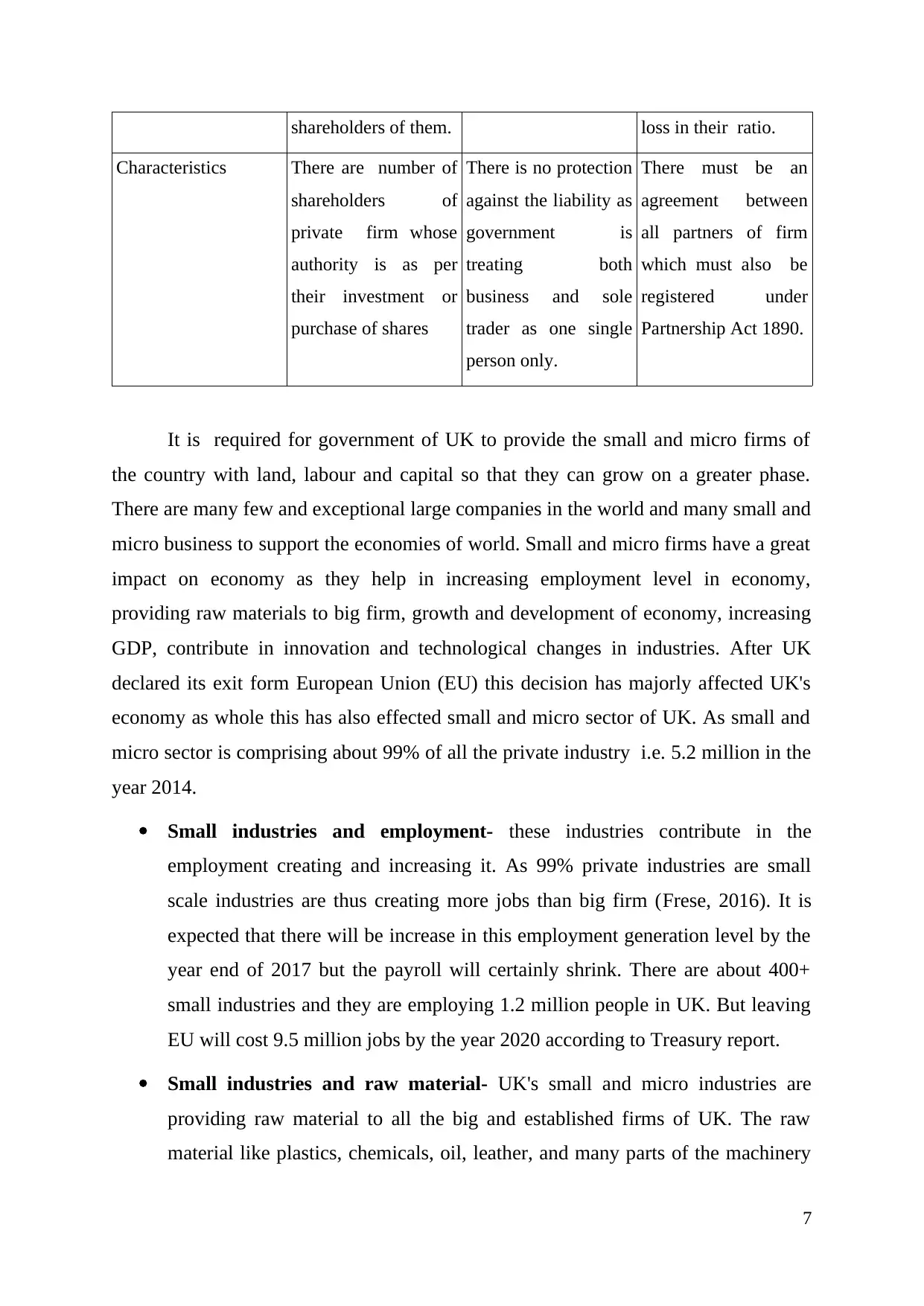
shareholders of them. loss in their ratio.
Characteristics There are number of
shareholders of
private firm whose
authority is as per
their investment or
purchase of shares
There is no protection
against the liability as
government is
treating both
business and sole
trader as one single
person only.
There must be an
agreement between
all partners of firm
which must also be
registered under
Partnership Act 1890.
It is required for government of UK to provide the small and micro firms of
the country with land, labour and capital so that they can grow on a greater phase.
There are many few and exceptional large companies in the world and many small and
micro business to support the economies of world. Small and micro firms have a great
impact on economy as they help in increasing employment level in economy,
providing raw materials to big firm, growth and development of economy, increasing
GDP, contribute in innovation and technological changes in industries. After UK
declared its exit form European Union (EU) this decision has majorly affected UK's
economy as whole this has also effected small and micro sector of UK. As small and
micro sector is comprising about 99% of all the private industry i.e. 5.2 million in the
year 2014.
Small industries and employment- these industries contribute in the
employment creating and increasing it. As 99% private industries are small
scale industries are thus creating more jobs than big firm (Frese, 2016). It is
expected that there will be increase in this employment generation level by the
year end of 2017 but the payroll will certainly shrink. There are about 400+
small industries and they are employing 1.2 million people in UK. But leaving
EU will cost 9.5 million jobs by the year 2020 according to Treasury report.
Small industries and raw material- UK's small and micro industries are
providing raw material to all the big and established firms of UK. The raw
material like plastics, chemicals, oil, leather, and many parts of the machinery
7
Characteristics There are number of
shareholders of
private firm whose
authority is as per
their investment or
purchase of shares
There is no protection
against the liability as
government is
treating both
business and sole
trader as one single
person only.
There must be an
agreement between
all partners of firm
which must also be
registered under
Partnership Act 1890.
It is required for government of UK to provide the small and micro firms of
the country with land, labour and capital so that they can grow on a greater phase.
There are many few and exceptional large companies in the world and many small and
micro business to support the economies of world. Small and micro firms have a great
impact on economy as they help in increasing employment level in economy,
providing raw materials to big firm, growth and development of economy, increasing
GDP, contribute in innovation and technological changes in industries. After UK
declared its exit form European Union (EU) this decision has majorly affected UK's
economy as whole this has also effected small and micro sector of UK. As small and
micro sector is comprising about 99% of all the private industry i.e. 5.2 million in the
year 2014.
Small industries and employment- these industries contribute in the
employment creating and increasing it. As 99% private industries are small
scale industries are thus creating more jobs than big firm (Frese, 2016). It is
expected that there will be increase in this employment generation level by the
year end of 2017 but the payroll will certainly shrink. There are about 400+
small industries and they are employing 1.2 million people in UK. But leaving
EU will cost 9.5 million jobs by the year 2020 according to Treasury report.
Small industries and raw material- UK's small and micro industries are
providing raw material to all the big and established firms of UK. The raw
material like plastics, chemicals, oil, leather, and many parts of the machinery
7
⊘ This is a preview!⊘
Do you want full access?
Subscribe today to unlock all pages.

Trusted by 1+ million students worldwide
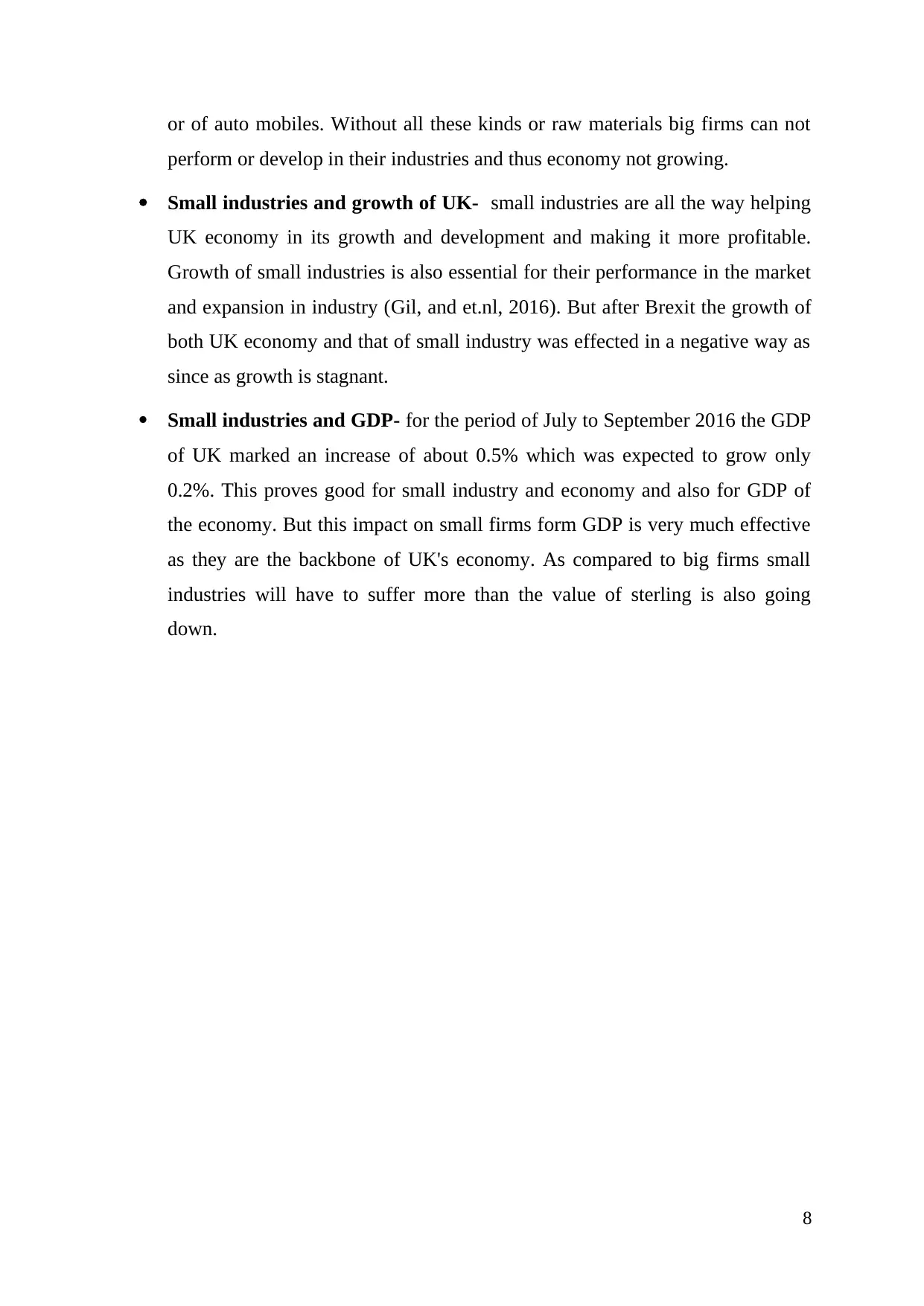
or of auto mobiles. Without all these kinds or raw materials big firms can not
perform or develop in their industries and thus economy not growing.
Small industries and growth of UK- small industries are all the way helping
UK economy in its growth and development and making it more profitable.
Growth of small industries is also essential for their performance in the market
and expansion in industry (Gil, and et.nl, 2016). But after Brexit the growth of
both UK economy and that of small industry was effected in a negative way as
since as growth is stagnant.
Small industries and GDP- for the period of July to September 2016 the GDP
of UK marked an increase of about 0.5% which was expected to grow only
0.2%. This proves good for small industry and economy and also for GDP of
the economy. But this impact on small firms form GDP is very much effective
as they are the backbone of UK's economy. As compared to big firms small
industries will have to suffer more than the value of sterling is also going
down.
8
perform or develop in their industries and thus economy not growing.
Small industries and growth of UK- small industries are all the way helping
UK economy in its growth and development and making it more profitable.
Growth of small industries is also essential for their performance in the market
and expansion in industry (Gil, and et.nl, 2016). But after Brexit the growth of
both UK economy and that of small industry was effected in a negative way as
since as growth is stagnant.
Small industries and GDP- for the period of July to September 2016 the GDP
of UK marked an increase of about 0.5% which was expected to grow only
0.2%. This proves good for small industry and economy and also for GDP of
the economy. But this impact on small firms form GDP is very much effective
as they are the backbone of UK's economy. As compared to big firms small
industries will have to suffer more than the value of sterling is also going
down.
8
Paraphrase This Document
Need a fresh take? Get an instant paraphrase of this document with our AI Paraphraser
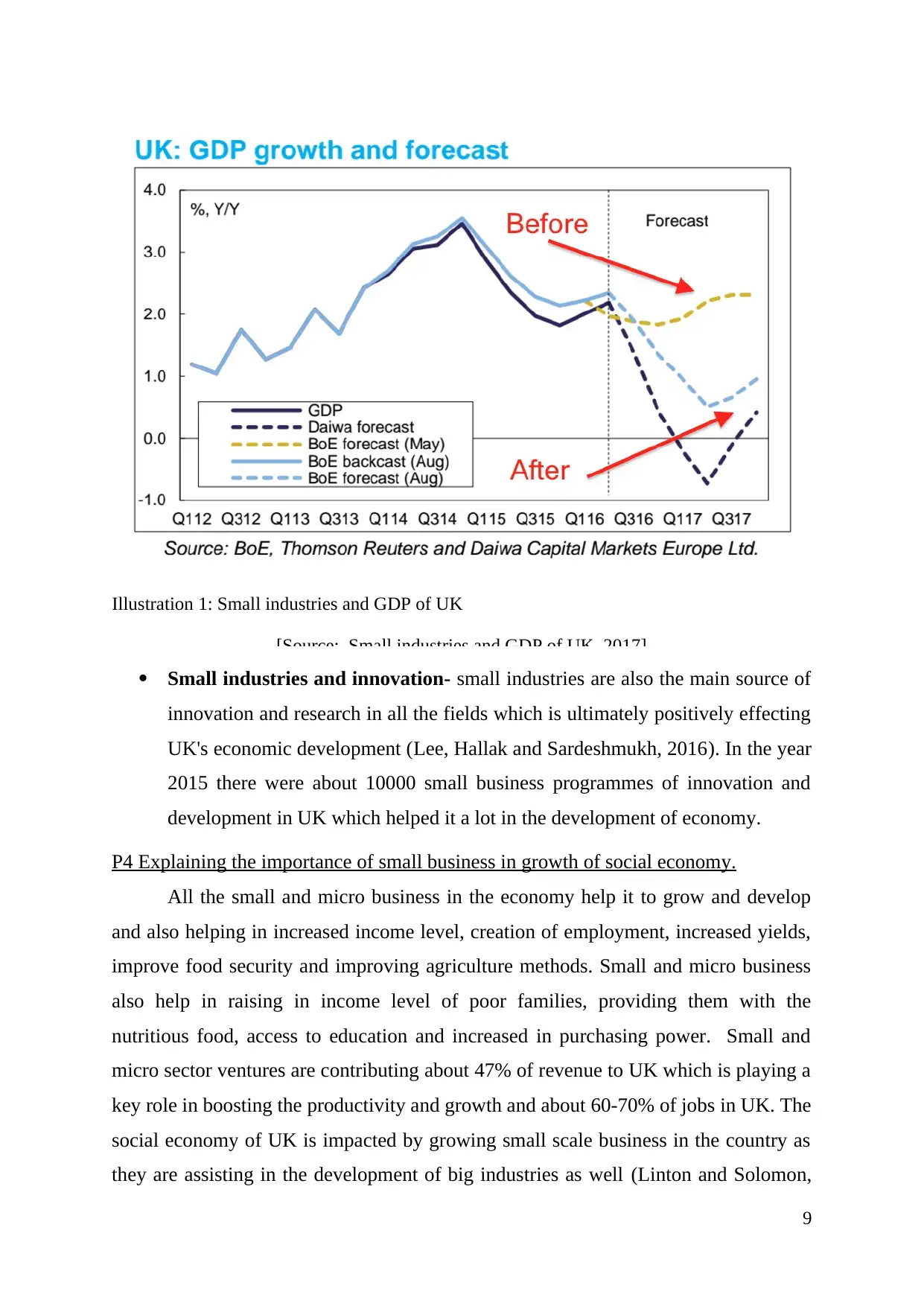
Illustration 1: Small industries and GDP of UK
[Source: Small industries and GDP of UK, 2017]
Small industries and innovation- small industries are also the main source of
innovation and research in all the fields which is ultimately positively effecting
UK's economic development (Lee, Hallak and Sardeshmukh, 2016). In the year
2015 there were about 10000 small business programmes of innovation and
development in UK which helped it a lot in the development of economy.
P4 Explaining the importance of small business in growth of social economy.
All the small and micro business in the economy help it to grow and develop
and also helping in increased income level, creation of employment, increased yields,
improve food security and improving agriculture methods. Small and micro business
also help in raising in income level of poor families, providing them with the
nutritious food, access to education and increased in purchasing power. Small and
micro sector ventures are contributing about 47% of revenue to UK which is playing a
key role in boosting the productivity and growth and about 60-70% of jobs in UK. The
social economy of UK is impacted by growing small scale business in the country as
they are assisting in the development of big industries as well (Linton and Solomon,
9
[Source: Small industries and GDP of UK, 2017]
Small industries and innovation- small industries are also the main source of
innovation and research in all the fields which is ultimately positively effecting
UK's economic development (Lee, Hallak and Sardeshmukh, 2016). In the year
2015 there were about 10000 small business programmes of innovation and
development in UK which helped it a lot in the development of economy.
P4 Explaining the importance of small business in growth of social economy.
All the small and micro business in the economy help it to grow and develop
and also helping in increased income level, creation of employment, increased yields,
improve food security and improving agriculture methods. Small and micro business
also help in raising in income level of poor families, providing them with the
nutritious food, access to education and increased in purchasing power. Small and
micro sector ventures are contributing about 47% of revenue to UK which is playing a
key role in boosting the productivity and growth and about 60-70% of jobs in UK. The
social economy of UK is impacted by growing small scale business in the country as
they are assisting in the development of big industries as well (Linton and Solomon,
9
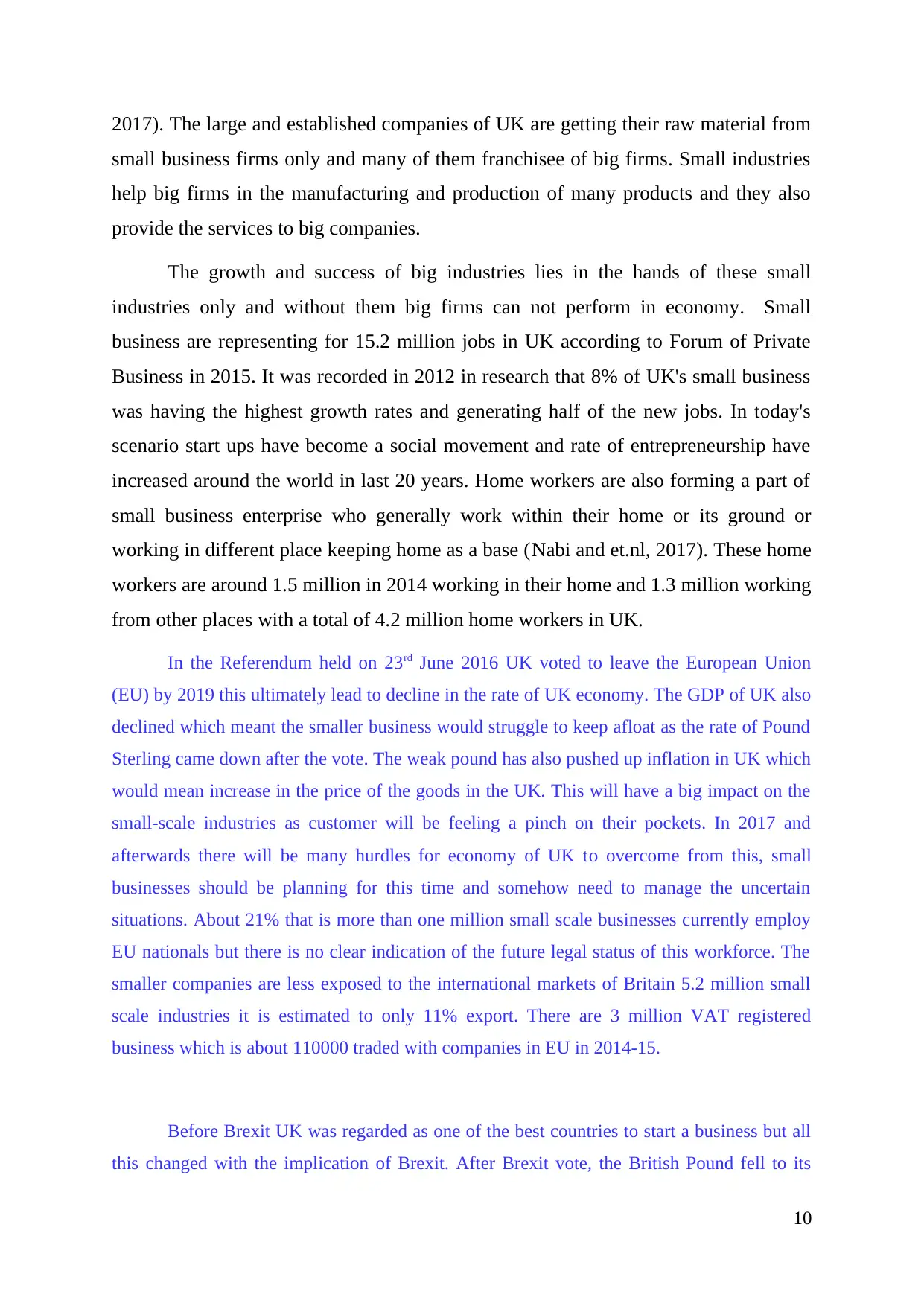
2017). The large and established companies of UK are getting their raw material from
small business firms only and many of them franchisee of big firms. Small industries
help big firms in the manufacturing and production of many products and they also
provide the services to big companies.
The growth and success of big industries lies in the hands of these small
industries only and without them big firms can not perform in economy. Small
business are representing for 15.2 million jobs in UK according to Forum of Private
Business in 2015. It was recorded in 2012 in research that 8% of UK's small business
was having the highest growth rates and generating half of the new jobs. In today's
scenario start ups have become a social movement and rate of entrepreneurship have
increased around the world in last 20 years. Home workers are also forming a part of
small business enterprise who generally work within their home or its ground or
working in different place keeping home as a base (Nabi and et.nl, 2017). These home
workers are around 1.5 million in 2014 working in their home and 1.3 million working
from other places with a total of 4.2 million home workers in UK.
In the Referendum held on 23rd June 2016 UK voted to leave the European Union
(EU) by 2019 this ultimately lead to decline in the rate of UK economy. The GDP of UK also
declined which meant the smaller business would struggle to keep afloat as the rate of Pound
Sterling came down after the vote. The weak pound has also pushed up inflation in UK which
would mean increase in the price of the goods in the UK. This will have a big impact on the
small-scale industries as customer will be feeling a pinch on their pockets. In 2017 and
afterwards there will be many hurdles for economy of UK to overcome from this, small
businesses should be planning for this time and somehow need to manage the uncertain
situations. About 21% that is more than one million small scale businesses currently employ
EU nationals but there is no clear indication of the future legal status of this workforce. The
smaller companies are less exposed to the international markets of Britain 5.2 million small
scale industries it is estimated to only 11% export. There are 3 million VAT registered
business which is about 110000 traded with companies in EU in 2014-15.
Before Brexit UK was regarded as one of the best countries to start a business but all
this changed with the implication of Brexit. After Brexit vote, the British Pound fell to its
10
small business firms only and many of them franchisee of big firms. Small industries
help big firms in the manufacturing and production of many products and they also
provide the services to big companies.
The growth and success of big industries lies in the hands of these small
industries only and without them big firms can not perform in economy. Small
business are representing for 15.2 million jobs in UK according to Forum of Private
Business in 2015. It was recorded in 2012 in research that 8% of UK's small business
was having the highest growth rates and generating half of the new jobs. In today's
scenario start ups have become a social movement and rate of entrepreneurship have
increased around the world in last 20 years. Home workers are also forming a part of
small business enterprise who generally work within their home or its ground or
working in different place keeping home as a base (Nabi and et.nl, 2017). These home
workers are around 1.5 million in 2014 working in their home and 1.3 million working
from other places with a total of 4.2 million home workers in UK.
In the Referendum held on 23rd June 2016 UK voted to leave the European Union
(EU) by 2019 this ultimately lead to decline in the rate of UK economy. The GDP of UK also
declined which meant the smaller business would struggle to keep afloat as the rate of Pound
Sterling came down after the vote. The weak pound has also pushed up inflation in UK which
would mean increase in the price of the goods in the UK. This will have a big impact on the
small-scale industries as customer will be feeling a pinch on their pockets. In 2017 and
afterwards there will be many hurdles for economy of UK to overcome from this, small
businesses should be planning for this time and somehow need to manage the uncertain
situations. About 21% that is more than one million small scale businesses currently employ
EU nationals but there is no clear indication of the future legal status of this workforce. The
smaller companies are less exposed to the international markets of Britain 5.2 million small
scale industries it is estimated to only 11% export. There are 3 million VAT registered
business which is about 110000 traded with companies in EU in 2014-15.
Before Brexit UK was regarded as one of the best countries to start a business but all
this changed with the implication of Brexit. After Brexit vote, the British Pound fell to its
10
⊘ This is a preview!⊘
Do you want full access?
Subscribe today to unlock all pages.

Trusted by 1+ million students worldwide
1 out of 20
Related Documents
Your All-in-One AI-Powered Toolkit for Academic Success.
+13062052269
info@desklib.com
Available 24*7 on WhatsApp / Email
![[object Object]](/_next/static/media/star-bottom.7253800d.svg)
Unlock your academic potential
Copyright © 2020–2025 A2Z Services. All Rights Reserved. Developed and managed by ZUCOL.





